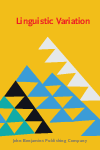
Linguistic Variation
Scope & Guideline
Unveiling the Nuances of Language Variation
Introduction
Aims and Scopes
- Language Variation and Change:
The journal emphasizes the investigation of how languages vary across different regions, dialects, and sociolinguistic contexts, including both synchronic and diachronic perspectives. - Morphosyntactic Variation:
Research often concentrates on morphosyntactic features, such as case marking, agreement patterns, and grammaticalization processes, providing insights into the structural aspects of language. - Cross-Linguistic Studies:
The journal promotes comparative studies across languages, focusing on universal principles of language structure and variation, which helps to identify patterns and anomalies in linguistic phenomena. - Empirical Methodologies:
A significant aspect of the journal is the use of diverse empirical methodologies, including qualitative and quantitative analyses, to study language variation and its sociolinguistic contexts. - Interdisciplinary Approaches:
The journal encourages interdisciplinary research that intersects with fields such as anthropology, psychology, and sociolinguistics, facilitating a broader understanding of linguistic variation.
Trending and Emerging
- Emergence of New Grammatical Structures:
Recent studies on the emergence of novel grammatical constructions in various languages, such as clausal nominalizations and differential object marking, indicate a trend towards understanding how new forms arise and stabilize in linguistic systems. - Partitivity and its Variations:
There is an increasing focus on partitive constructions across languages, which suggests a growing interest in the semantic and syntactic nuances of partitivity and its implications for language structure. - Microvariation Studies:
Research on microvariation, particularly within dialects and closely related languages, is gaining traction, emphasizing the fine-grained differences that inform broader linguistic theories. - Cross-Linguistic Data Collection:
The journal is increasingly featuring studies that utilize cross-linguistic datasets, highlighting the importance of empirical data in understanding universal and language-specific patterns of variation. - Sociolinguistic Dimensions of Variation:
Themes exploring the sociolinguistic aspects of language use, including variation influenced by social factors such as identity, community, and context, are becoming more prevalent, reflecting a holistic approach to linguistic variation.
Declining or Waning
- Historical Linguistics:
Research focusing on the historical aspects of language change has become less frequent, suggesting a shift towards more contemporary analyses of language variation and usage. - Phonetic Variation Studies:
There appears to be a waning interest in purely phonetic variation studies, as the journal increasingly emphasizes morphosyntactic and semantic aspects of linguistic variation. - Language Contact Phenomena:
While still relevant, the exploration of language contact and its effects on variation has decreased, possibly due to a growing focus on internal linguistic mechanisms rather than external influences. - Descriptive Linguistics:
There is a noticeable decline in purely descriptive studies of individual languages, with a greater emphasis on theoretical implications and comparative analyses.
Similar Journals
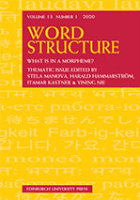
Word Structure
Advancing Linguistic Theory and Empirical InsightsWord Structure is a premier journal published by Edinburgh University Press, specializing in the dynamic field of linguistics and language studies. Since its inception in 2008, this journal has carved a niche within the academic community, achieving an impressive Q1 ranking in the Linguistics and Language category for 2023, further affirming its reputation as a leading platform for innovative research. With its robust rankings in both the arts and humanities and social sciences spheres, positioned in the top percentiles, Word Structure serves as an essential resource for linguists, researchers, and students interested in the intricate mechanisms of word formation and morphology. Although it does not offer open access, the journal is dedicated to advancing the understanding of linguistic theory and empirical findings, making significant contributions to ongoing discussions in the field. By facilitating scholarly dialogue and promoting high-quality research, Word Structure plays a crucial role in shaping contemporary linguistics and enhancing the academic discourse surrounding language structures.
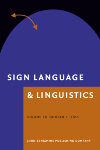
Sign Language & Linguistics
Bridging Cultures through Sign Language ResearchSign Language & Linguistics is an esteemed academic journal published by John Benjamins Publishing Co, dedicated to advancing the field of sign language studies and linguistics. With an ISSN of 1387-9316 and an E-ISSN of 1569-996X, this journal has earned a prominent place in the linguistic community, achieving a Q1 ranking in both the Linguistics and Language category, and standing out within the Scopus rankings, placing in the 77th percentile among the Arts and Humanities and 75th percentile in the Social Sciences categories. Sign Language & Linguistics spans over two decades of research, offering comprehensive insights and analyses from 1998 to 2024, promoting high-quality scholarly communication. Aimed at researchers, professionals, and students alike, this journal is essential for those exploring the intersection of sign languages, linguistics, and cultural studies, facilitating progressive discourse and fostering an understanding of this vital mode of human communication.
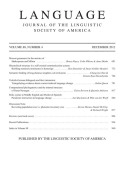
LANGUAGE
Pioneering Research in Linguistics and LanguageLANGUAGE, published by the Linguistic Society of America, is a premier academic journal dedicated to the rigorous study of linguistic theory and practice. With an ISSN of 0097-8507 and E-ISSN 1535-0665, this esteemed journal has established itself as a leading publication in the field of linguistics since its inception. The journal has consistently maintained a high impact factor, being ranked in the Q1 category in Linguistics and Language for 2023, placing it among the top tier of academic journals. Notably, it also holds impressive Scopus rankings, being positioned at #75 out of 1088 in Arts and Humanities, and #89 out of 1167 in Social Sciences, demonstrating a significant impact and reach in the discipline. While it is not an open-access journal, LANGUAGE provides crucial insights into linguistic research, fostering a vibrant academic community. Spanning years from 1996 to 2024, it continues to be an essential resource for researchers, professionals, and students alike, aiming to advance the understanding of language in its myriad forms and functions.
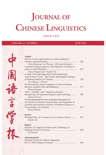
JOURNAL OF CHINESE LINGUISTICS
Fostering Interdisciplinary Dialogue in Chinese LinguisticsJOURNAL OF CHINESE LINGUISTICS, published by the JOURNAL CHINESE LINGUISTICS, is a prominent periodical that serves as a vital resource for researchers and scholars in the fields of linguistics and Chinese studies. With its ISSN 0091-3723, this journal has been contributing to the academic community since 1996 and continues to publish innovative research until 2024. Although it is classified in the third quartile (Q3) for both Arts and Humanities and Linguistics categories, its focus on Chinese linguistics positions it uniquely within this specialized domain. The journal is committed to advancing the understanding of Chinese language structures, usage, and context, encouraging interdisciplinary dialogue among linguists and language researchers. While currently not labeled as open access, the journal remains accessible to institutions and scholars worldwide, creating an invaluable platform for disseminating knowledge. As such, it plays a critical role in promoting linguistic diversity and cultural awareness within the academic landscape.
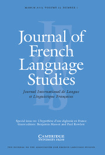
Journal of French Language Studies
Connecting Scholars through French Language ExplorationJournal of French Language Studies, published by Cambridge University Press, is a prestigious and leading journal in the field of linguistics and language that provides a platform for scholarly articles and research findings relevant to the French language and its various dimensions. With an impressive Q1 ranking in the 2023 categorization and ranked #257 out of 1088 in Scopus for Language and Linguistics, this journal plays a pivotal role in advancing the study of French linguistic methodologies, sociolinguistics, and applied linguistics. Since its inception in 1991, the journal has continually contributed to the academic community, attracting innovative investigations and theoretical discussions that enrich understanding and research in the field. Researchers and students enjoy comprehensive access to critical analysis and emerging trends, and as it continues to converge towards 2024, the journal promises to remain an essential resource for exploring the evolving landscape of French language studies.
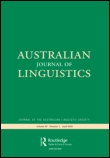
Australian Journal of Linguistics
Advancing the Frontiers of Linguistic ResearchThe Australian Journal of Linguistics, published by Routledge Journals, Taylor & Francis Ltd, stands as a distinguished platform in the field of linguistics, fostering rigorous academic discourse since its inception in 1981. With an ISSN of 0726-8602 and an E-ISSN of 1469-2996, the journal has achieved a notable Q2 ranking in the linguistics and language category for 2023, indicating its quality and relevance within the academic community. With a Scopus ranking of #316 in Arts & Humanities and #373 in Social Sciences, it sits in the 71st and 68th percentiles respectively, underscoring its impact in the fields it encompasses. The journal aims to publish high-quality research articles that contribute to the understanding of linguistic theory, sociolinguistics, and applied linguistics, making it an essential resource for researchers, professionals, and students alike. The journal is based in the United Kingdom, at 2-4 Park Square, Milton Park, Abingdon OX14 4RN, Oxon, England, and actively encourages contributions that can expand the current linguistic discourse, reinforcing its commitment to highlighting diverse perspectives in language research.
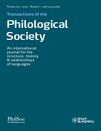
TRANSACTIONS OF THE PHILOLOGICAL SOCIETY
Unveiling the Rich Tapestry of Language ResearchTRANSACTIONS OF THE PHILOLOGICAL SOCIETY, published by Wiley, is a prestigious journal focusing on the fields of linguistics and language studies. With a rich history that spans over 180 years, having been established in 1842, this journal continues to contribute significantly to the academic discourse on language and linguistics. It holds an impressive impact factor and ranks in the Q2 category for both Linguistics and Language in the 2023 category quartiles, underscoring its relevance and scholarly influence, as evidenced by its rankings in the Scopus database. Researchers, professionals, and students will find this journal invaluable for accessing high-quality research articles that illuminate various aspects of language and linguistics. While the journal does not currently offer open access, it remains a vital resource for anyone dedicated to advancing knowledge in these fields. Its address in the United Kingdom underscores its international reach and commitment to academic excellence.
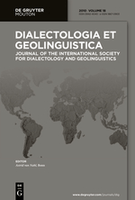
Dialectologia et Geolinguistica
Unveiling the Connections Between Language and PlaceDialectologia et Geolinguistica is a prominent academic journal in the field of linguistics, published by De Gruyter Mouton, a respected name in scholarly publishing. With an ISSN of 0942-4040 and an E-ISSN of 1867-0903, this journal is dedicated to the study of dialects and their geographical variants, enriching our understanding of language in its social and cultural contexts. Operating from Germany and serving a global audience, Dialectologia et Geolinguistica has a significant impact factor, placing it in the Q2 category for Linguistics and Language in 2023. The journal's extensive research contributions have earned it notable rankings in both the Arts and Humanities and Social Sciences categories, reflecting its valuable insights into language dynamics. Though currently not an open-access publication, the journal hosts a wealth of research articles spanning various topics within dialectology and geolinguistics, making it an essential resource for researchers, professionals, and students looking to advance their knowledge in these vibrant areas of study.

Journal of Portuguese Linguistics
Exploring the Depths of Portuguese LinguisticsThe Journal of Portuguese Linguistics is an esteemed peer-reviewed academic journal published by UBIQUITY PRESS LTD, dedicated to the exploration of the rich complexities of the Portuguese language and its various linguistic dimensions. With an ISSN of 1645-4537 and an E-ISSN of 2397-5563, this open-access journal has been disseminating valuable research since 2002, ensuring that knowledge is accessible to all scholars, professionals, and students interested in Linguistics. Based in Portugal, it features a distinct focus on the linguistics pertinent to the Portuguese language, facilitating discussions that span theoretical and applied interests. The journal holds a respectable Q3 quartile rank in the field of Linguistics and Language, reflecting its growing significance and contribution to academia, as evidenced by Scopus rankings that place it in the 71st and 68th percentiles in Arts and Humanities as well as Social Sciences. Researchers and practitioners alike will find Journal of Portuguese Linguistics to be an indispensable resource for fostering discourse and innovation in the study of language.
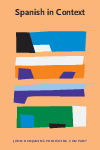
Spanish in Context
Exploring the Rich Tapestry of Spanish Language and LiteratureSpanish in Context, published by John Benjamins Publishing Co, is a leading journal in the field of linguistics and literature, focusing on the contexts and uses of the Spanish language. With an ISSN of 1571-0718 and an E-ISSN of 1571-0726, this reputable journal has established itself as an essential resource for researchers, professionals, and students alike since its inception in 2004. The journal enjoys a strong presence in academic discourse, holding a prestigious Q2 category ranking in Linguistics and Language, and an esteemed Q1 ranking in Literature and Literary Theory for the year 2023. Furthermore, its contributions to the field are underscored by impressive Scopus rankings: it occupies the 40th position in the Arts and Humanities category for Literature and Literary Theory, representing the top 96th percentile. With an ongoing commitment to advancing scholarship and understanding of Spanish in various contexts until 2024, the journal welcomes original research articles, reviews, and critical essays that delve into linguistic innovations and literary trends. By fostering a dynamic dialogue among academics and practitioners, Spanish in Context plays a vital role in enhancing the visibility and relevance of Spanish studies on a global scale.